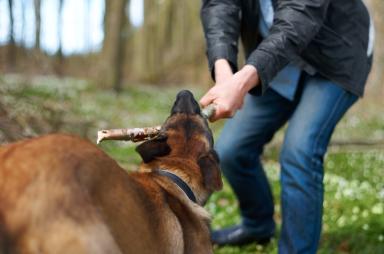How To File a Dog Bite Lawsuit [2024]

There are many of us in this country who live with four-legged companions. However, dog bite injuries remain a concern across the country. A 2020 study reported that nearly 1,000 citizens per day seek emergency medical treatment for severe dog bite injuries. What can you do if you find yourself among those affected? How can you seek justice and the compensation you deserve?
In this article, we'll guide you through filing a dog bite lawsuit, breaking down the process into manageable steps. From exploring the types of compensation available to victims to discussing how a personal injury attorney can help, we'll provide a comprehensive road map to assist you in securing compensation.
Steps for Filing a Dog Bite Lawsuit
Filing a dog bite lawsuit can be complex, and understanding the specific steps is crucial for a successful case. Below, we have outlined the general steps for filing a dog bite lawsuit. However, be sure to check with your local jurisdiction for specific actions, as liability laws and procedures vary from one state to another.
1. Seek Medical Attention
After a dog bite, your health should be the first priority. Seek medical care as soon as possible, ideally immediately after the incident. The importance of this step is twofold:
Assessment of Injuries: A medical professional can assess the extent of your injuries, determine if there is any risk of infection, and provide the necessary treatment.
Documentation: Your medical records will serve as essential evidence if you pursue a legal claim. They provide a detailed account of your injuries and the treatment you received.
Promptly seeking medical attention is crucial for your health and any potential legal action you may take. It establishes a clear record of your injuries, their treatment, and the associated expenses, which can be essential when pursuing compensation for your damages in a dog bite lawsuit.
2. Identify the Dog Owner
In some cases, the dog’s owner may be immediately apparent, while in others, it may be less obvious. If the owner is present, ask them for their name, contact information, and address. They may be willing to provide this information voluntarily.
In situations where the dog might have gotten out, and the owner is not present, you should ask witnesses present if they know the dog owner or if they can provide information about the owner. You can also take photos or videos of the dog, the scene of the incident, and any visible information, such as tags on the dog's collar. This can help identify the dog and potentially its owner.
If you cannot identify the owner or if the owner refuses to provide their information, consider reporting the incident to your local animal control or law enforcement agency. They may have records of the dog's owner, especially if it's a repeat incident or if the dog has a history of aggressive behavior.
3. Gather Evidence
While your medical documentation is valuable evidence, gathering more proof can significantly impact your ability to file a lawsuit. You can start by:
Taking Photos: Take clear and detailed photographs of your injuries as soon as possible after the dog bite. Pictures should show the extent of your wounds, bruising or swelling, and stitches or bandages. Continue taking photos at regular intervals as your injuries heal to document the progress.
Gathering Witness Statements: Obtain statements from witnesses who saw the dog bite incident. Witnesses can provide critical testimony regarding the dog's behavior, the bite's circumstances, and the owner's actions. Collect their information for future reference.
Recording Your Damages: Keep detailed records of all expenses and losses related to the dog bite. This includes medical bills, receipts for medication, therapy costs, and other out-of-pocket expenses. Also, document any lost wages or income if you had to take time off work due to your injuries.
4. File a Report
In many jurisdictions, you should first contact your local animal control agency to report the dog bite. They are responsible for handling issues related to dangerous or aggressive animals. Look up the contact information for your local animal control office, typically a city or county government division.
In addition to reporting the incident to animal control, consider contacting your local law enforcement agency, such as the police department or sheriff's office. It may be important to take this step if the dog owner acted negligently during the incident or if any criminal aspects were involved, such as violating leash laws or having an aggressive dog off-leash.
After you have filed the report, ask for a copy for your records. A copy of the official report can be necessary for pursuing legal action or providing evidence to insurance companies.
5. Consult an Attorney
An experienced personal injury attorney can provide essential guidance and legal support throughout the process, especially when determining liability, filing a lawsuit, and negotiating with insurance companies.
Determining Liability: Your attorney will thoroughly review the details of the dog bite incident, including the evidence you’ve fathered, witness statements, medical records, and any relevant laws in your jurisdiction. They will assess the strength of your case to determine if liability can be established.
Filing a Lawsuit: If your attorney determines that you have a valid claim, they will draft a complaint that outlines the details of the case, the allegations against the dog owner, and the damages you are seeking. They will file this complaint with the appropriate court to initiate the lawsuit.
Coordinating with Insurance Companies: If the dog owner has homeowner’s or renter’s insurance, your attorney will communicate with the insurance company on your behalf. They will submit the necessary documentation and negotiate with the insurer for a fair settlement.
Overall, consulting with an attorney is crucial because they have the legal expertise to navigate the complexities of dog bite cases while protecting your rights and working towards securing the compensation you deserve. They can provide personalized advice based on your specific situation and the laws in your jurisdiction, helping you make informed decisions throughout the legal process.
Types of Compensation
Depending on the circumstances of your case and the laws in your jurisdiction, you may be eligible to recover various types of compensation, including the following:
Medical Expenses: Compensation for all past and future medical costs related to the dog bite, including hospital bills, surgeries, doctor’s visits, medications, rehabilitation, and therapy.
Pain and Suffering: Damages for physical pain, emotional distress, mental anguish, and the overall suffering experienced due to the dog bite.
Lost Wages: Reimbursement for income lost due to time off work for medical treatment, recovery, or disability resulting from the dog bite. This may include future lost earning capacity if the injuries prevent the victim from working as they did before the incident.
Property Damage: Compensation for any damage caused by the dog during the attack, such as torn clothing, damaged personal belongings, or broken glasses.
Legal Fees and Costs: In some cases, the dog owner may be responsible for covering the victim’s legal fees and court costs associated with pursuing a lawsuit.
The availability and the amount of compensation can vary depending on the severity of your injuries, the circumstances of the dog bite, and the laws in the jurisdiction where the incident occurred. Consulting with a personal injury attorney specializing in dog bite cases can help you understand your specific rights and potential for recovery based on your unique situation.
Utilizing Homeowner’s Insurance
Homeowner's insurance policies typically cover dog bite incidents, providing compensation for medical expenses, pain and suffering, and other damages. The process involves filing a claim with the dog owner's insurance company. While it's possible to do this solo, consulting a personal injury attorney can help navigate this process effectively, ensuring a fair settlement without out-of-pocket expenses for the victim or the dog’s owner.
Understanding Personal Injury Laws
Personal injury laws outline the legal responsibilities of dog owners while providing a framework for victims to pursue claims. Understanding these laws can boost your chances of a successful settlement. With this knowledge, you can assess liability, gather evidence, and navigate the legal process effectively. These laws can also help you negotiate with insurance companies, file a lawsuit if necessary, and seek compensation for your medical bills, pain and suffering, and other damages.
Contact an Attorney
While the prospect of hiring an attorney may seem daunting due to the associated costs, their invaluable expertise and advocacy often outweigh these concerns when pursuing compensation, particularly in dog bite cases. Here are a few ways that a personal injury attorney can help boost your chances of a successful outcome, along with what you can do to secure higher compensation.
Hiring Your Attorney
Expertise.com's Personal Injury Lawyer Directory is your trusted ally when you're a dog bite victim seeking justice. Our carefully vetted lawyers provide their clients with the highest quality legal representation and have proven to be reputable providers in the industry over time. We've done the homework so you can confidently select the right attorney for your case. With Expertise.com, you're in good hands, and your pursuit of justice starts with the peace of mind that you've chosen a lawyer who specializes in personal injury cases, ensuring the best possible outcome for your dog bite claim.
Expertise.com StaffAuthor
Step into the world of Expertise.com, your go-to hub for credible insights. We don't take accuracy lightly around here. Our squad of expert reviewers, each a maestro in their field, has given the green light to every single article you'll find. From rigorous fact-checking to meticulous evaluations of service providers, we've got it all covered. So feel free to dive in and explore. The information you'll uncover has been stamped with the seal of approval by our top-notch experts.




